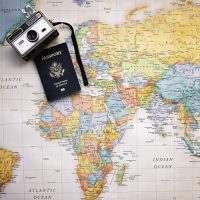Nothing quite beats going on a vacation.
And nowadays, whether visiting a new town or city or simply chilling by the poolside, you can book your entire trip, flight, accommodation, and more with a simple click online.
Unfortunately, scammers are developing new ways to defraud travelers of their hard-earned money and time off, creating elaborate scams that can ruin your trip before it even begins.
In this article, you will learn about the most common travel scams operating in 2024.
As well as identifying common features of bogus offers, you’ll also learn simple but effective ways to avoid them and ensure you only travel in complete safety!
Contents
Four Travel Scams to Be Aware of for 2024
Firstly, how common are travel scams becoming?
According to data from 2022, the Federal Trade Commission found that over 62,000 instances of travel fraud were reported, costing an average of $1,259 per person.
The figure will only rise as new schemes and technologies are developed.
Below are four of the most common travel scams to be mindful of:
1. Phishing scams
Phishing is among the most common online scams worldwide, especially in the travel industry.
This is when scammers impersonate legitimate companies, services, and people to gain your trust and steal your information or money.
The most common phishing scams in the travel industry are fake accommodation listings.
Scammers use fake photos and information to imitate genuine property owners and quickly gain bookings they cannot fulfill.
Phishing scams can also impersonate booking websites by creating almost identical websites of reputable brands you know and love.
Users will be tricked into logging into this ‘fake’ website using their actual passwords and giving scammers sensitive information to defraud them with.
Finally, scammers may imitate travel company customer support on social media or via email.
They will impersonate a helpful employee to gain your trust, scrape your personal information, or redirect you to a travel scam of their choosing.
2. Robocalls with fake deals
Robocalls are pre-recorded phone calls often used to sell you something.
In the travel industry, these calls will advertise cheap vacation deals that are only available for a limited time, prompting you to act quickly.
Robocalls are often scams from the offset because companies require your permission ahead of time to contact you in this way.
If a person, service, or company is cold-calling you with a pre-recorded message, they’re likely up to no good, aware they are breaking regulations and offering you a deal that doesn’t exist.
3. Hackers stealing information on public Wi-Fi
While many people think that travel scams focus on the booking stages of travel, a growing number target people already enjoying their vacation.
This is usually through internet use.
Opportunistic scammers often lurk around public Wi-Fi networks, such as airports, cafes, libraries, and other locations, prying on absent-minded travelers.
These networks typically have little to no protections to safeguard user activity.
Scammers can easily position themselves between you and a network.
These scams are known as ‘man-in-the-middle’ attacks.
They can even create their own fake Wi-Fi connection.
All this is to harvest personal data like passwords or financial information as you browse.
4. Travel document scams
When traveling overseas, you will often need additional documentation, certification, or clearance to gain entry into a country.
Scammers now target essential documents like visas, passports, insurance, and vaccination certificates.
Criminals often create copycat sites of official government agencies and claim to help you get the proper accreditation or convert your existing documents (like driver’s licenses) for a fee.
They may also ask you to supply sensitive information when booking something online, such as a screenshot of your passport.
These scams aim to collect your sensitive information, then forge your documents, and use them in future deception.
Two Ways of Protecting Yourself Against Travel Scams
As cunning as travel scams are becoming, there are ways you can protect yourself from them.
Two of the most effective include:
1. Examining listings carefully
As elaborate as scams may seem, thankfully, there are common red flags you can be on the lookout for.
These include:
- Low prices: If it’s too good to be true, it probably is. Low prices often attract the most attention and convince you to book.
- Poor descriptions: Listings with poor spelling, grammar, or awkward ‘copy-and-paste’ phrases should not be trusted.
- Overly positive reviews: Scammers often post fraudulent reviews to manipulate their ratings, making them seem trustworthy. When reading customer experiences, always look for a mixture of opinions.
- Suspicious images: Low-quality photographs have been more than likely cropped or stolen from other websites.
- Check URLs: Be vigilant about fraudulent website addresses. Scammers often misspell a legitimate website to trick you into giving them your information.
2. Using a virtual private network (VPN)
Whether booking online, researching our trips, or uploading photos while on the move, we constantly use the internet for travel.
Unfortunately, this can introduce many security risks, especially when connecting to public Wi-Fi networks at our destinations.
A VPN is your best defense against this kind of travel cyberattack.
It encrypts your internet connection, scrambling data and making it impossible for anyone to track you.
Especially when on the move, a VPN for mobile will ensure that your smartphone is impenetrable.
You can browse on the go, check reservations, book flights, and more with total peace of mind that your information is out of reach from potential scams.
The Final Word
2024 is set to become a big year for traveling.
But you must become vigilant about the growing number of scams targeting the industry designed to scrape personal information and rob you of your money.
By following these safety tips, you can travel with peace of mind and book with confidence.
Not only that, but no matter where you go, you’ll have the peace of mind that your information is kept safe, secure, and out of reach from scammers.











